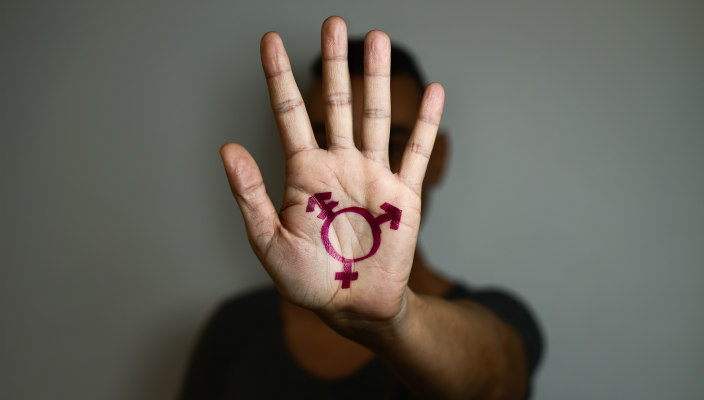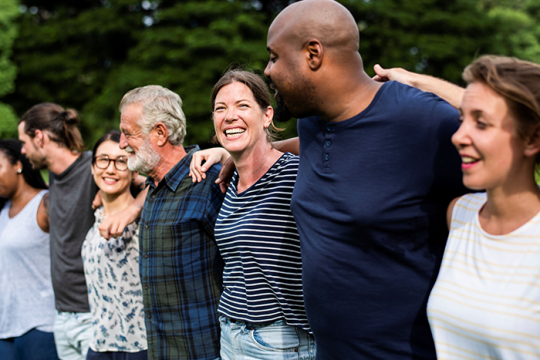Share Your Gender Pronouns: It's a Sign of Welcome!

“When two people relate to each other authentically and humanly, God is the electricity that surges between them.”
― Martin Buber
People often join congregations to find a sense of community and to develop authentic relationships that nurture their personal and spiritual growth. Authentic relationships are not easy, so it makes sense that “Love your neighbor as yourself” is repeated many times in the Torah. Such relationships can be made even more difficult when biases deeply imbedded in our culture – racism, sexism, homophobia, transphobia, ableism, and other prejudices – interrupt our thinking and impede our capacity to see each other clearly and form deep connections.
Even under ideal circumstances, connecting with others can be unbearably awkward, so it’s understandable that we often seek to build relationships with those who are similar to us. This strategy, though, deeply limits our experiences. It cuts us off from each other across lines of difference, and it can privilege groups of people over others in unjust and inequitable ways.
Within synagogues, it can mean that those who are deemed to be “different” may be made to feel as though they are not being welcomed into the community fully. People on the margins, including working class Jews, Jews of Color, LGBTQ Jews, people with disabilities, and members of interfaith families, to name a few, often are expected to conform to the culture that is considered normal. What might it look like instead if synagogues and those on the margins shared the responsibility of working through differences, finding similarities, investigating unconscious biases, and rising above the awkwardness to form meaningful and enriching relationships?
One small but significant way to do this is to invite members of a community to share their gender pronouns when introducing themselves. Whether verbally, in an email signature, or on a name tag, adding she/her/hers, he/him/his, or they/them/theirs (a common gender-neutral pronoun) to introductions helps promote authentic relationships by creating a way for everyone to share an expression of their gender identity.
Historically, many cultures have assumed that people are either male or female. However, Jewish scholars in ancient times acknowledged a wider diversity of gender. Today, we understand that to be their authentic selves, many people may identify as transgender, non-binary, or gender non-conforming.
Those of us who are cisgender – meaning that we identify with the gender we were assigned at birth – rarely think about our pronouns. For people who are transgender or non-binary, pronouns can be a hurdle to being in real, authentic relationship with others. When we share our pronouns when introducing ourselves – in person and in print – we more equally share responsibility for building meaningful relationships with people who are different from us. Such actions powerfully demonstrate allyship, and a recognition of transgender and non-binary people, and the issues they face.
The URJ’s adoption of the Resolution on the Rights of Transgender and Gender Non-Conforming People, which declared our movement’s “commitment to the full equality, inclusion and acceptance of people of all gender identities and gender expressions,” marked the beginning of the journey to promote a greater level of authentic relationship with transgender and gender non-conforming people. Sharing your pronouns on a regular basis – a simple, positive gesture – can demonstrate our sincerity, individually and collectively, to this commitment.
We hope, of course, that more transgender and gender non-conforming people will join our communities – as members, staff, and leaders. Even if you are not currently aware of any trans or gender non-conforming people in your community, consider incorporating the practice of sharing pronouns. That way, when such individuals join your community – as members or staff – you will be able to give them a safe way to articulate their identity that others already understand.
This practice will not only provide a warm welcome, but also help to create a comfortable environment in which people can be their true selves in authentic relationship with others.
To learn more about inclusivity as it relates to LGBTQ individuals and families, register for the Audacious Hospitality LGBTQ Online Learning Series. Complete this form for access to the Audacious Hospitality Toolkit and Educational Resource Modules, designed to support congregations and their leaders as they embrace the diversity that is the reality and future of modern Jewish life.
Have something to say about this post? Join the conversation in The Tent, the social network for congregational leaders of the Reform Movement. You can also tweet us or tell us how you feel on Facebook.
April Baskin is the Union for Reform Judaism's vice president of audacious hospitality. Learn more about April and her professional experience. Cantor Shira Stanford-Asiyo, who lives in the Bay Area, is a program manager on the Union for Reform Judaism's audacious hospitality team.
Related Posts

Supporting Immigrants and Refugees in This Challenging Moment

Summer Resources for Year-Round Board Success

